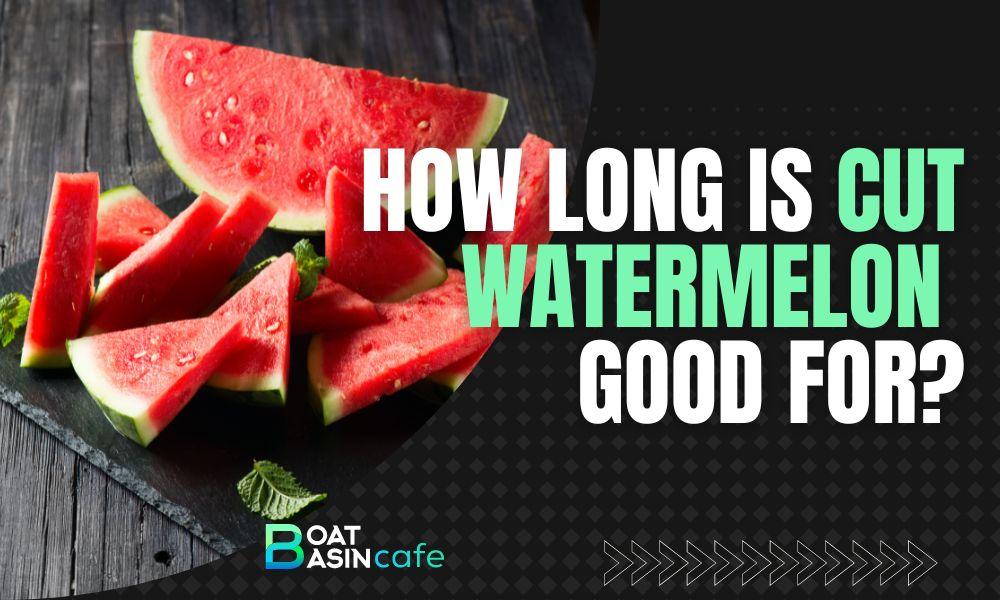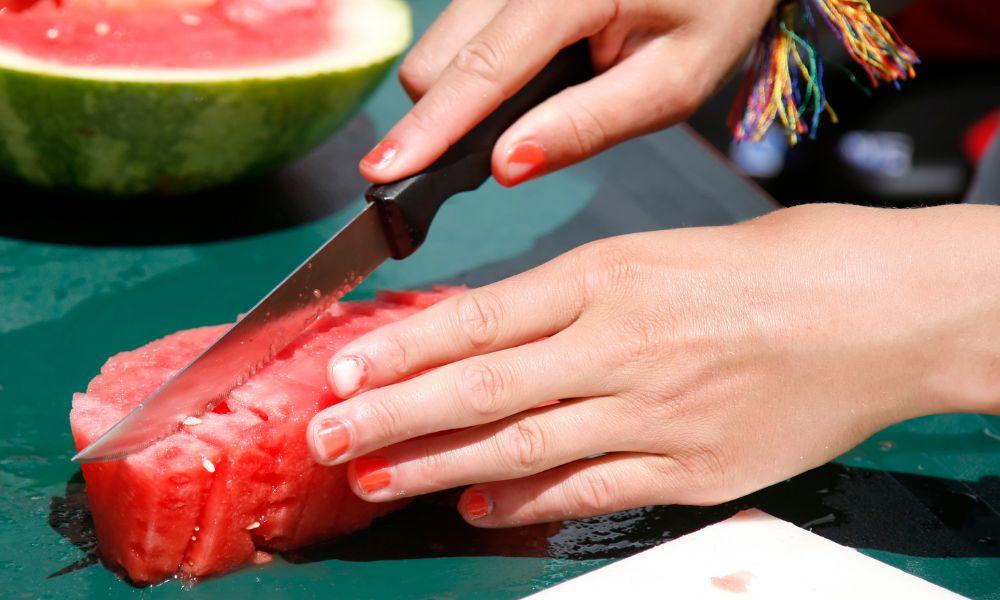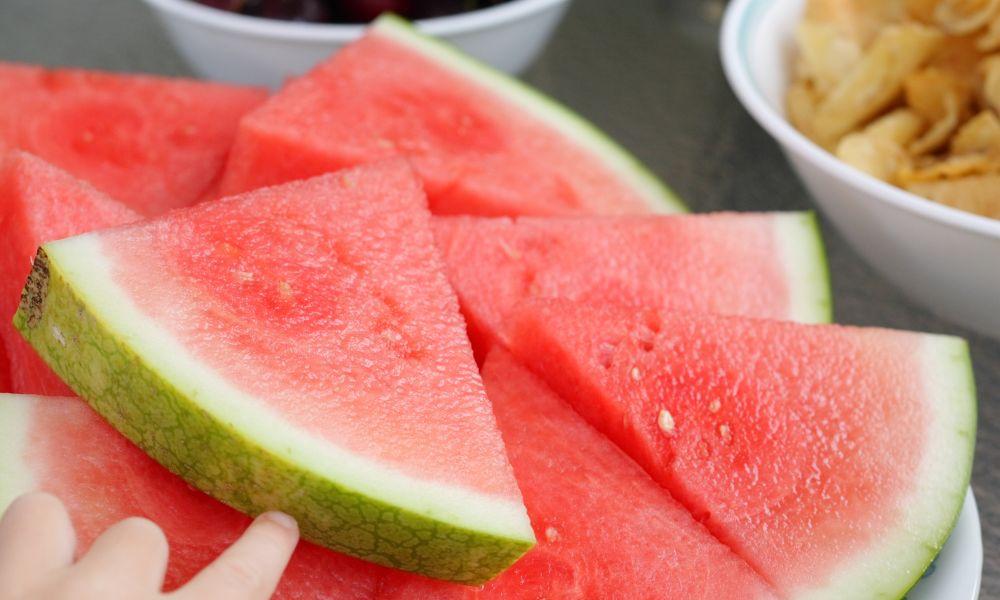Nothing screams summer more than biting into a juicy slice of watermelon. However, when you have some watermelon left over, it’s essential to know how long is watermelon good for once cut. It’s time to say goodbye to the confusion!
In this article, we explore all essential aspects of cut watermelon storage, including the factors impacting its shelf life, proper storage techniques, and proven methods to extend its freshness. With our handy storage tips, you’ll always enjoy this delightful summer treat at its best!

How Long Does Cut Watermelon Stay Fresh?
Cut watermelon shelf life is influenced by various factors such as temperature, moisture, and exposure to air. Generally, at room temperature, cut watermelon can last for about two hours before it starts to lose its freshness and nutritional value. On the other hand, when stored appropriately in the refrigerator, it can last up to 3-5 days.
However, there are several factors that can affect the freshness of your cut watermelon, which we will discuss below.
🌡️The Impact of Temperature
One of the primary factors in determining how long is watermelon good for once cut is the temperature at which it is stored. For instance, a temperature above 41°F (5°C) can promote bacterial growth and shorten the shelf life of cut watermelon.
It’s also important to avoid frequent temperature changes, as this can accelerate the ripening process and spoilage. Make sure to keep your cut watermelon stored at a consistent, cool temperature.
💧The Role of Moisture
Moisture plays a crucial role in maintaining watermelon freshness. Cut watermelons lose natural moisture when exposed to air, which can lead to degradation in taste and texture. To extend its shelf life, it’s necessary to reduce its exposure to air and store it in a moisture-controlled environment.
💨Exposure to Air
Air exposure can also negatively impact the longevity of your cut watermelon. When left exposed to air, the fruit loses moisture, and the oxidation process speeds up, causing spoilage. Proper storage techniques can help minimize air exposure and ultimately prolong freshness.
Proper Storage Techniques

Using the right storage methods is essential to prevent spoilage and maintain the quality of your cut watermelon. Here are a few steps to store your cut watermelon correctly to enjoy it in its optimal state:
Cleaning and Drying
Before storing your watermelon, make sure to thoroughly wash the rind under running water to remove any surface dirt or bacteria that can contaminate the fruit during the cutting process. After cutting, gently pat the slices dry with a clean kitchen towel or paper towel to remove excess moisture.
Selecting the Right Storage Containers
Using the right storage container plays a significant role in preserving taste and preventing your cut watermelon from losing its freshness. An airtight container is ideal for storing cut watermelon, as it helps retain the fruit’s moisture while minimizing air exposure.
Sealing Methods
Sealing your cut watermelon properly is crucial to maintaining quality and preventing spoilage. You can use plastic wrap, aluminum foil, or an airtight container with a tight-fitting lid. It is also a good idea to place a sheet of parchment paper or paper towel underneath the cut watermelon to absorb any excess moisture.
Signs of Spoilage

Unfortunately, cut watermelon doesn’t last forever. It’s important to recognize the common signs of spoilage so you can avoid consuming unsafe or unpalatable fruit. Some indicators that your cut watermelon may have gone bad are:
- Mold or slimy film on the surface
- Foul or fermented odor
- Mushy or overly soft texture
- Excessive juice pooling with an off smell
If you notice any of these telltale signs of spoilage, it’s best to discard the cut watermelon and avoid the potential health risks associated with consuming contaminated fruit.
Extending the Shelf Life
To make the most of your cut watermelon and enjoy its best taste, you can employ a few techniques to extend its shelf life. Here are some helpful tips to observe:
Refrigeration
Storing cut watermelon in the refrigerator serves as the best method for prolonging its freshness. In comparison to leaving it at room temperature, cut watermelon lasts longer in the fridge, as the cool environment slows down the ripening process and minimizes the risk of bacterial growth.
Wrapping with Plastic Wrap
As previously mentioned, wrapping cut watermelon with plastic wrap can help maintain its quality and freshness. It’s essential to ensure the wrap is tightly secured to retain moisture and minimize air exposure. Another option is to use beeswax wraps, which are an eco-friendly alternative to traditional plastic wrap.
Using Airtight Containers
Storing cut watermelon in an airtight container can help prolong freshness by keeping moisture in and preventing exposure to air. Remember to choose a tight-fitting lid to lock in moisture and protect the fruit from contaminants.
Freezing Cut Watermelon
Freezing cut watermelon can significantly extend its usability and is an excellent option for individuals who might not consume the fruit quickly enough. Follow these steps to freeze cut watermelon slices:
- Thoroughly clean and dry your cut watermelon.
- Place the slices on a wax paper-lined baking sheet, ensuring they do not touch.
- Put the baking sheet in the freezer for 2-3 hours, or until the slices are firm.
- Transfer the frozen slices to a freezer-safe airtight container or resealable plastic bag.
- Store the container or bag in the freezer for up to 6 months.
To thaw the frozen watermelon slices, place them in the refrigerator for several hours or at room temperature for about 15-20 minutes. Keep in mind that freezing and thawing cut watermelon may result in changes to its texture and flavor. The thawed slices may become slightly mushy and less sweet, making them better suited for smoothies or other recipes rather than for fresh consumption.
FAQs
How long can cut watermelon be stored in the refrigerator?
Properly stored cut watermelon can last up to 3-5 days in the refrigerator.
Can I leave cut watermelon out at room temperature?
It is not recommended to leave cut watermelon at room temperature for more than 2 hours, as this increases the risk of bacterial growth and spoilage.
Is it safe to eat cut watermelon that has been left out overnight?
Consuming cut watermelon left out overnight is not advised, as it increases the risk of exposure to bacteria, causing potential foodborne illnesses.
Should I store cut watermelon with or without seeds?
It is a personal preference, but removing seeds before storage can make the watermelon easier to eat once thawed.
Can I store cut watermelon in an airtight container?
Yes, airtight containers are ideal for maintaining the freshness and quality of cut watermelon.
How can I tell if cut watermelon has gone bad?
Signs of spoilage include mold or slimy film, foul or fermented odor, mushy or overly soft texture, and excessive juice pooling with an off smell.
Can I use cut watermelon that has been frozen for smoothies or other recipes?
Yes, frozen cut watermelon can be used in smoothies, juices, or other recipes, as thawing may cause changes in texture and flavor better suited for these food preparations.
Conclusion
Armed with these watermelon storage tips, you can now confidently enjoy every mouthful knowing that your cut watermelon will stay fresh and delicious for longer. It’s time to put these methods to the test and delight your taste buds with the refreshing taste of well-stored watermelon slices. So go ahead, relish this fruity treat without worries, and beat the summer heat in the most delicious way possible!
References
- USDA Food Safety and Inspection Service. (n.d.). Safe steps in food handling, cooking, and storage. Retrieved from https://www.fsis.usda.gov/food-safety/safe-food-handling-and-preparation/checklist/safe-steps-food-handling-cooking-and-storage
- Centers for Disease Control and Prevention. (2019). Guide to fresh fruit storage. Retrieved from https://www.cdc.gov/nutrition/infantandtoddlernutrition/foods-and-drinks/storage.html
- National Watermelon Promotion Board. (n.d.). Watermelon 101. Retrieved from https://www.watermelon.org/watermelon-101
- PennState Extension. (2020). Home food preservation: Freezing fruits. Retrieved from https://extension.psu.edu/home-food-preservation-freezing-fruits